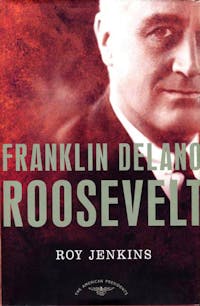Franklin Delano Roosevelt
The American Presidents Series: The 32nd President, 1933-1945
 Download image
Download image
ISBN10: 0805069593
ISBN13: 9780805069594
Hardcover
208 Pages
$35.00
CA$49.00
Franklin Delano Roosevelt was a statesman whose massive achievements tower over the twentieth century. In a ranking of American presidents, he is rivaled only by George Washington and Abraham Lincoln. He was elected to an unprecedented four terms in office, and his accomplishments in leading the nation through depression and world war resonate to this day.
Roosevelt's presidency was one of the most eventful in U.S. history. He took office in the midst of economic crisis: the stock market had crashed, the banking system had collapsed, and millions of Americans were unemployed. Galvanizing the nation with his 1933 inaugural address and with a flurry of legislation in the First Hundred Days, Roosevelt demonstrated an optimism and resolve that garnered quick support for his administration and for the programs that he called the New Deal. And he was the first president truly to understand the power of the new mass media, rallying the nation through "fireside chats" on the radio and speeches that were the mainstay of movie house newsreels.
In acute, stylish prose, Roy Jenkins—who was a prominent British politician as well as a bestselling historian—tackles all of the complexities and intricacies of Roosevelt's character. Though not an intellectual himself, Roosevelt was nonetheless able to inspire the intellectual classes. He was from the higher reaches of the American upper class, and yet his great talent was to inspire confidence among working people during a time of economic and international turmoil. And when he had to shift his priorities after Pearl Harbor from (in his words) "Dr. New Deal" to "Dr. Win-the-War," he did so without any loss in the people's confidence.
Franklin Delano Roosevelt was the dominant president of the twentieth century and helped the United States become the most influential world power. Roy Jenkins's keen assessment enables us to understand how he accomplished this and why he still stands tall in our estimation today.
Reviews
Praise for Franklin Delano Roosevelt
"[Roosevelt] was more tested in peace and war than any president other than Lincoln. Although often seen as a patrician among profession politicians, he was perhaps the most skilled politician of the lot. He was even more than that: he was a blazer of trails. He aroused great loyalty and he dazzled those around him with inspiriting personal charm. Yet by the end of his not very long life several of those who had most helped his rise had moved not only to detachment but to full opposition. He was therefore a man as full of ambiguity as he was of power and interest."—Roy Jenkins on Franklin Delano Roosevelt
"Captures FDR in all his contradictions . . . Elegantly describing FDR's course through a score of personal and political ordeals, Jenkins astutely shows us the man in all his many incarnations: the confident son of privilege who morphed into a wry, young politico on the rise [as well as] the startled victim, for whom all things had previously come so easily, hitting the brick wall of polio and fighting back [to lead] his broken country out of its two great 20th-century crises, the Great Depression and World War II."—Publishers Weekly



